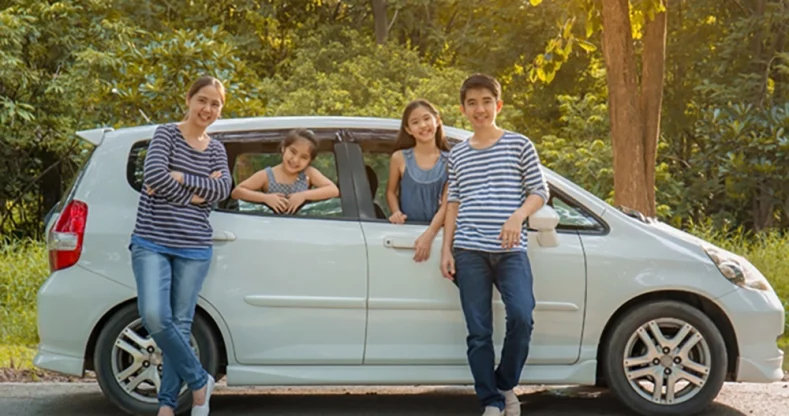May 25, 2025
Choosing the right family car is one of the most important decisions parents make. It’s not just about getting from point A to point B—it’s about safety, comfort, practicality, and creating positive experiences for every family member. With so many options available and features constantly evolving, knowing what to prioritize can feel overwhelming.
The perfect family car balances safety, space, reliability, and value while meeting your family’s unique needs. Whether you’re a new parent preparing for your first child or managing the complex logistics of multiple kids with different activities, the right vehicle can significantly improve your daily life.
Safety: The Non-Negotiable Foundation
When it comes to family vehicles, safety should always be the top priority. Modern cars offer sophisticated safety technologies that were unimaginable just a decade ago.
Essential Safety Features
Look for vehicles that have earned top safety ratings from both the Insurance Institute for Highway Safety (IIHS) and the National Highway Traffic Safety Administration (NHTSA). A five-star overall safety rating should be considered the minimum standard for any family vehicle.
Advanced Driver Assistance Systems (ADAS)
Modern family cars should include comprehensive driver assistance features that help prevent accidents before they happen:
- Automatic Emergency Braking can detect potential collisions and apply brakes if the driver doesn’t respond quickly enough
- Blind Spot Monitoring alerts drivers to vehicles in their blind spots, crucial when changing lanes with kids distracting you
- Lane Departure Warning and Lane Keeping Assist help prevent accidents caused by driver fatigue or distraction
- Adaptive Cruise Control maintains safe following distances automatically, reducing driver fatigue on long trips
Child-Specific Safety Considerations
Family cars need safety features designed specifically for protecting younger passengers:
- LATCH (Lower Anchors and Tethers for Children) system should be easily accessible in multiple seating positions
- Rear door child safety locks that are simple for adults to engage and disengage
- Rear cross-traffic alert to prevent backing into children or objects in driveways and parking lots
- Rearview cameras with wide-angle views to eliminate blind spots behind the vehicle
Space and Seating: Room to Grow
Family needs evolve quickly, and your car should accommodate growth and changing circumstances.
Passenger Capacity
Consider not just your current family size but potential future needs. Many families find that seven or eight-seat vehicles provide valuable flexibility for carpools, grandparent visits, or family friends joining outings.
Cargo Space
Families accumulate gear quickly—strollers, sports equipment, groceries, luggage, and countless other items. Look for vehicles with:
- Generous cargo capacity behind the rear seats for everyday hauling
- Fold-flat rear seats that expand cargo space when needed
- Low lift-over height making it easier to load heavy items
- Wide opening tailgates that provide easy access to the cargo area
- Underfloor storage compartments for organizing smaller items and keeping them secure
Seating Flexibility
The best family cars offer versatile seating arrangements:
- Second-row captain’s chairs provide easier access to third-row seating
- Sliding second-row seats that can move forward to create more legroom for third-row passengers
- Removable seats in some minivans offer maximum cargo flexibility
- Reclining rear seats for passenger comfort during long trips
Convenience Features That Matter
Modern families are busy, and convenience features can significantly impact daily life quality.
Easy Entry and Exit
Features that make getting in and out of the vehicle easier benefit everyone:
- Power sliding doors on minivans eliminate the need to manually slide heavy doors
- Wide door openings accommodate car seats and make it easier for kids to climb in independently
- Running boards or side steps help shorter family members access taller vehicles
- Hands-free power liftgates allow parents to open the cargo area even with their hands full
Climate Control
Keeping everyone comfortable, especially during long trips, requires thoughtful climate systems:
- Tri-zone or quad-zone climate control allows different temperature settings for various seating areas
- Rear air conditioning vents ensure passengers in back rows stay comfortable
- Remote start capability allows you to pre-cool or pre-heat the vehicle before loading kids
- Heated and ventilated seats provide comfort in extreme weather conditions
Storage Solutions
Families need places to store the countless items they carry:
- Center console with multiple compartments for organizing small items
- Door pockets large enough for water bottles and tablets
- Seatback pockets that are easily accessible to passengers
- Cup holders positioned conveniently throughout the cabin
- Hooks and tie-downs in cargo areas for securing items
Technology and Entertainment
Modern family cars serve as mobile command centers, requiring robust technology systems.
Infotainment Systems
Look for systems that balance functionality with ease of use:
- Large, responsive touchscreens that are easy to operate while driving
- Apple CarPlay and Android Auto integration for seamless smartphone connectivity
- Multiple USB ports strategically placed throughout the cabin for device charging
- Wireless charging pads for compatible smartphones
- Voice recognition systems that allow hands-free operation of key functions
Rear-Seat Entertainment
Long trips become more manageable with entertainment options for passengers:
- Rear-seat entertainment screens with headphone jacks for quiet viewing
- Wi-Fi hotspots that keep devices connected during travel
- Multiple power outlets for gaming devices and tablets
- Streaming capability that works with popular apps and services
Navigation and Communication
Family logistics often require sophisticated navigation and communication features:
- Built-in GPS navigation with real-time traffic updates
- Integration with family calendar systems for automatic destination suggestions
- Hands-free calling with clear audio quality
- Emergency assistance features that can automatically call for help in case of an accident
Fuel Efficiency and Operating Costs
Family vehicles typically accumulate high mileage quickly, making efficiency and operating costs crucial considerations.
Fuel Economy
With rising fuel costs and environmental concerns, efficient vehicles save money and reduce environmental impact:
- Hybrid powertrains offer excellent fuel economy without range anxiety
- Turbocharged engines provide good power with better efficiency than larger naturally aspirated engines
- CVT or advanced automatic transmissions optimize engine efficiency across driving conditions
Maintenance and Reliability
Family cars need to be dependable and affordable to maintain:
- Strong reliability ratings from sources like J.D. Power and Consumer Reports
- Comprehensive warranty coverage that provides peace of mind
- Reasonable maintenance costs and widely available service
- Good resale value to protect your investment
Practical Considerations
Beyond features and technology, practical factors significantly impact family car satisfaction.
Budget and Value
Determine your total budget including:
- Purchase price or monthly payment that fits comfortably in your budget
- Insurance costs which can vary significantly between vehicle types
- Fuel costs based on your expected annual mileage
- Maintenance and repair expenses over your expected ownership period
Lifestyle Fit
Consider how the vehicle fits your family’s specific lifestyle:
- Urban vs. suburban driving requirements may favor different vehicle types
- Parking limitations in your area might eliminate larger vehicles
- Towing needs for boats, trailers, or campers
- Off-road capability if your family enjoys outdoor adventures

Future Planning
Think about how your needs might change:
- Growing family requiring additional seating capacity
- Aging parents who might need easier vehicle access
- Teenage drivers who will eventually use the family car
- Changing work situations that might affect commuting needs
Vehicle Type Considerations
Different vehicle types offer distinct advantages for families.
Minivans
Often dismissed unfairly, minivans typically offer the most family-friendly features:
- Maximum interior space and seating flexibility
- Easy entry and exit with sliding doors and low step-in height
- Superior storage solutions throughout the cabin
- Best value for space and features
Three-Row SUVs
Popular for their commanding driving position and versatility:
- Higher seating position provides better visibility
- All-wheel drive capability for weather and light off-road use
- Towing capacity for recreational equipment
- More rugged appearance that many families prefer
Large Sedans
Still relevant for families prioritizing fuel economy and driving dynamics:
- Better fuel economy than SUVs or minivans
- Superior ride quality and handling
- Lower operating costs including insurance and maintenance
- Adequate space for smaller families
Making the Final Decision
After researching features and options, the decision process should include practical steps:
Test Drive Extensively
Spend significant time in potential vehicles:
- Drive in various conditions including city traffic, highways, and parking lots
- Test all seating positions to ensure comfort for all family members
- Practice loading car seats and cargo to verify ease of use
- Evaluate visibility from the driver’s seat in all directions
Consider Total Cost of Ownership
Look beyond the purchase price to understand true costs:
- Depreciation rates affect your investment value
- Insurance premiums can vary significantly between models
- Fuel costs based on your driving patterns
- Maintenance schedules and typical repair costs
Read Reviews and Ratings
Gather information from multiple sources:
- Professional automotive reviews from trusted publications
- Owner surveys that reveal long-term satisfaction and problems
- Safety ratings from IIHS and NHTSA
- Reliability data from consumer reporting organizations
Conclusion: Finding Your Family’s Perfect Match
The ideal family car balances safety, practicality, comfort, and value while meeting your specific needs and preferences. While the perfect vehicle for every family doesn’t exist, the right vehicle for your family definitely does.
Start with safety as your foundation, then prioritize the features that matter most to your daily life. Whether that’s maximum cargo space, fuel efficiency, advanced technology, or seating flexibility depends on your unique circumstances.
Remember that family cars are long-term investments that will be part of countless memories—school pickups, family vacations, weekend activities, and daily adventures. Choose thoughtfully, test thoroughly, and select the vehicle that will serve your family reliably for years to come.
The time invested in careful research and consideration will pay dividends in safety, satisfaction, and peace of mind as your family creates memories on the road ahead.
Ready to start shopping? Create a prioritized list of must-have features, set a realistic budget, and begin test driving vehicles that meet your criteria. Your perfect family car is out there waiting to become part of your family’s story.
